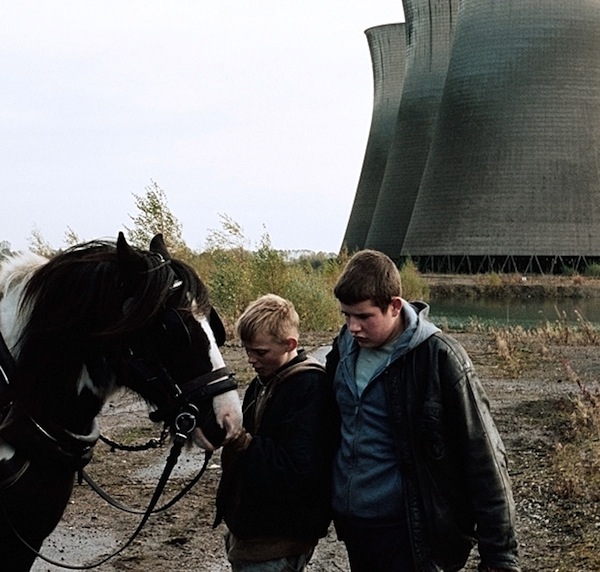You have no items in your cart. Want to get some nice things?
Go shoppingThe relationship of two northern boys is the centre of this social realist film in Clio Barnard’s deftly-handled second feature
Britain and its filmmakers have long been exponents of social realist cinema. Expressions of this genre were visible even in the country’s earliest filmic roots, but since the British New Wave in the post-war UK, the trappings of social realism have been something of a trademark. Director Clio Barnard merged the genre with theatre and documentary in her formally blistering feature debut The Arbor three years ago, and now she returns to the same area with her first straight fiction film. An account of similar lives to those explored in her first film – with a protagonist knowingly nicknamed Arbor – is a haunting contemporary fable, The Selfish Giant.
This is no mere exercise in typical kitchen-sink miserablism, however. Barnard may have eschewed her more challenging formal experimentation but she is not resting on her laurels, and has crafted a poetic pseudo-mythical drama amongst the scrap heaps and council estates of Bradford. Despite a final third that lurches into tragic melodrama, and devastates its audience in the process, the film is filled with cheek and good humour, largely thanks to the excellent performances from its two lead child actors.
Connor Chapman impressively fills the boots of the smart-aleck trouble-maker, Arbor. Full of nervous energy and pent-up aggression, he suffers from some form of Attention Deficit Disorder and is the younger of two sons that drive his mother to distraction. Dad is not on the scene and soon Arbor finds himself permanently expelled from school after a fight breaks out in the playground. He may be defending the honour of his quiet friend, Swifty (Shaun Thomas), from a gang of bullies, but the pair of them have a reputation and are excluded nonetheless. That hardly causes a break in Arbor’s cocky little stride because he has loftier ambitions – to make a fortune collecting scrap copper.
The Selfish Giant begins before the boys’ expulsion and with Arbor under his bed screaming at a world he doesn’t gel with and calmed only by the presence of his best pal. They steal out into the night and liberate a beautiful carthorse from a nearby field. They chance upon a couple of local scroungers stealing the copper inners of railway tubing, and when the thieves are caught in the act, they make off with the stash and sell it to a local scrapyard overseer, and owner of the aforementioned horse, Kitten (Sean Gilder). Once their days are no longer filled with schooling, Arbor convinces Swifty to partner up with him in collecting scrap.
It’s between the clip-clopping of a shaggy horse and the council estate home-lives that Barnard manages to adroitly balance the lead duo’s last vestiges of childhood whimsy with the harsh reality of their lives. Kitten is no genial rag-and-bone man, however, and his yard is all looming shadows and molten glows, like some locale straight from the mouths of the Grimms. When he takes more of an interest in Swifty’s instinctive ability with horses (with a view to avenging a racing defeat), Arbor’s frustrations threaten to derail their enterprise entirely.
This relationship, between Arbor and Swifty, is the heart and soul of the film. Both are, deep down, good boys – even when the former is driving you up the wall – and their mutual affection is wonderfully portrayed in Chapman and Thomas’ exceptionally assured performances. When the situation does take a more dramatic turn in the final third, having moved at something approaching a trot previously, it falls on their shoulders to convincingly lead the drama and they don’t let down in the slightest. The events are also deftly handled by Barnard so as to allow the characters’ emotions space to breathe.
Equally impressive is the splendid cinematography from Mike Eley, who manages to compound the fable-like quality amidst the run-down environs. The film’s visuals lend to an impression of seeing through the grime, and seeing through the hardships. The Selfish Giant may not have the formal innovation of Barnard’s Arbor, but she’s shown herself as more than adept at channelling social realism into something evocative and highly emotive.
About Ben Nicholson
A compulsive cinephile, Ben fell in love with film through repeated viewings of Michael Jackson being transformed into a werewolf behind the scenes of John Landis' seminal video for Thriller. This passion has manifested itself in his consumption of movies and the enjoyment derived from reading, discussion and writing about cinema which can all be found on New Urbanite. His favourite films include The Third Man, In The Mood For Love, Badlands, 3 Iron, Casablanca, Ran, and Last Year in Marienbad - to name but a few.





